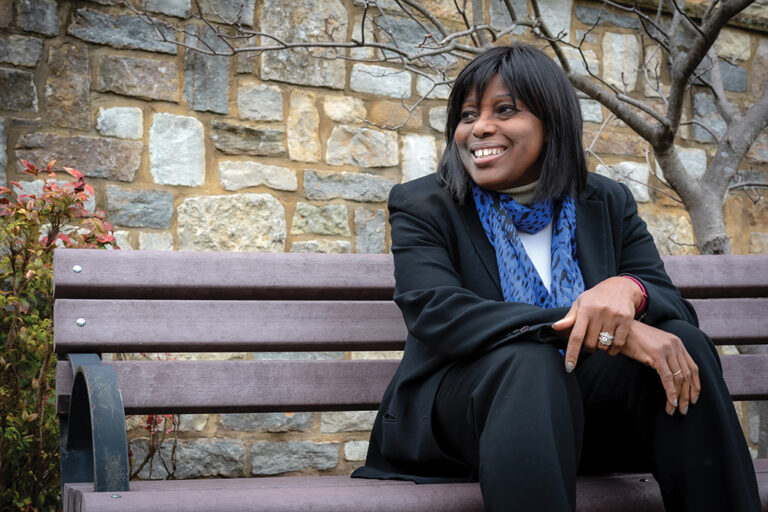A profile of Sylvia Asante, dean of Labor
Berea’s dean of labor, Dr. Sylvia Asante, had some idea about the work that goes on at Berea College before she came because she had done some research on work colleges in the past. And she had heard some things from friends, as well.
“My friend said, ‘Berea’s very clean, you know, Sylvia, because the students do [so much of] the work. They take pride in the place.’”
This legend proved true, in her estimation, and as she leans into a storied role at Berea College, Asante hopes to encourage students to take that same sort of pride in themselves as they move on to their lives and careers after graduation.
“I’m helping students to formulate who they are,” she said. “We look at students, mentor them and mold them into successful human beings. It’s important to me because I know the value of education, the value of making a difference.”
The first woman and first immigrant to take the role, Asante came to the United States from Jamaica. She settled first in Brooklyn among a large immigrant population and then moved to Pennsylvania, where she studied sociology while working at Gettysburg College. Asante continued her professional and academic career at Shippensburg University, where she studied student college personnel and counseling, and Antioch University, where she completed a doctorate in leadership and change. In the course of her career, Asante has received numerous awards, including “Woman of Distinction” and the Martin Luther King, Jr. “Living the Dream Award.”
“A family member said you can come to America and be whatever you want to be,” she said. “Just be dedicated to the cause of what you’re doing.”
Asante also brings the Jamaican cultural value of the “side hustle,” the idea of having skills to fall back on in the event one career aspiration doesn’t quite work out, which she believes Berea instills in students through the Labor program.
I’m helping students to formulate who they are. We look at students, mentor them and mold them into successful human beings.
Dr. Sylvia Asante
“If you’re going to be a nurse, that’s fine,” she said, “but maybe you want to know how to bake a good cake or how to run a restaurant.”
Another value Asante brings with her that incorporates well into the Berea model is the idea that there is dignity in all work that needs to be done.
“The Fourth Commitment is oh so beautiful,” Asante said. “I have it framed on my desk. I want our students to be aware of the beauty of it. If you look through the centuries, it’s those who worked in the fields and brought bread to the table and took care of people’s children who made up the backbone of different places all over the world. So yes, dignity, understanding there is dignity in the work.
“If you’re here on campus, and you’re working in dining, helping to make the bread, that’s a skillset you have now accomplished,” she continued. “Berea is giving you a gift, one you can pass on to others.”
The gifts Berea offers to its students also align with Asante’s spiritual commitments. “I consider myself a Christian, living by Christian principles, and Berea speaks to that in so many ways, making a difference and giving back.”
She collects admissions materials and sends them to her home church in Pennsylvania to encourage the congregation to consider Berea College for their children. One young man has matriculated at Berea as a result of this effort.
“I’m proud of that,” she said. “The parents said ‘We didn’t know a place like this existed. We thought he was going to have to go into the military.’ Those are the things that fulfill me, allow me to give back and to be thankful for what I have been given.”
Asante sees that sense of wanting to give back in labor supervisors, as well, noting how dedicated they are to the cause of training students to succeed in the workforce. “Supervisors will bring food for a student, or if a student is not properly dressed [for winter], you say ‘Do you need an extra coat?’ We find ways. Here, we open the door and say, ‘If we’re going to help you, we’re going to help you all the way.’”
Part of helping students all the way is enabling the sharing of knowledge and the development of a variety of skillsets. Asante works toward these ends, but there are other important aspects of preparing students for the workforce. There are soft skills, for example, learning how to shake hands or dress for a presentation or interview. And there is also an area that is perhaps overlooked: financial wellness. When students leave college, they also leave the support structure of the college and, because of their financial backgrounds, don’t have parents of means to assist them in setting up their lives.
“They don’t have a dad to say, ‘OK, come into the business that I’ve prepared for you for 30 years.’ They don’t have someone who says ‘Call your Uncle Bill or Aunt Mary.’ They don’t have that, so they have to come prepared and ready to move ahead.”
Preparing them to move ahead means equipping them to succeed financially and professionally, and the Labor program at Berea can turn its attention to these aspects of life after college. As the Labor program takes on the 21st century, this is where Asante will make her mark.
“When you leave Berea,” she said, “you can leave with your diploma and
a transcript of the work you have done, which will testify to the work you are capable of doing. When Berea students show up [to a job interview], they are selected because people know they have been through it. They know how to be disciplined and how to get the work done.”


